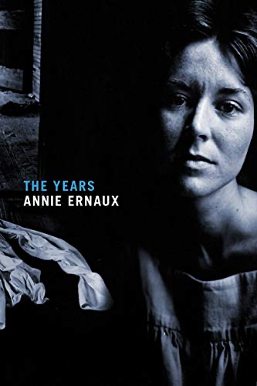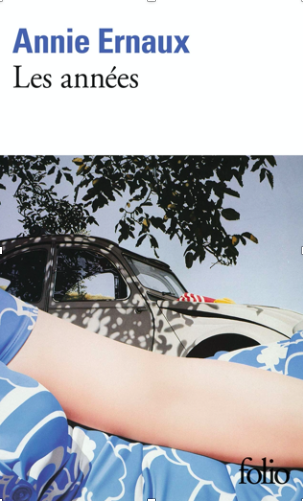Les Années (The Years) by Annie Ernaux: bookclub event recap
The author of ‘Les Années‘ (The Years) is Annie Ernaux, an acclaimed and award-winning writer whose works are predominantly autobiographical. ‘The Years’ was translated by Alison L. Strayer.
Introduction
The book title may seem somewhat sterile at first glance and suggest any timeline in anyone’s life.
‘The Years‘ is a memoir that spans Annie Ernaux’s life from her birth in 1940 to 2006. Writing about herself in the third person, she reminisces about:-
- her upbringing in a working-class household in Normandy,
- her years as a French teacher in a lycée,
- her life as a wife and mother of two sons living in the Parisian suburb of Cergy,
- her eventual divorce, and
- her becoming the individual for whom carrying this book project to fruition is a matter of importance.
All of these personal memories are woven into the grand tapestry of the French political, social, and cultural history that spans the years covered by Ernaux’s narrative.
Thus, this personal memoir is also a collective one.
Prompting discussion
In order to prompt discussion the following questions had been posted in the MyFrenchLife Community bookchat Facebook group prior to our bookclub event and were written in the ‘chat’ section of the Zoom event:
Question #1:
‘Les Années‘ is both a personal autobiography and an autobiography of Ernaux’s generation. How well do you think they work together? Also:
– In what ways is it an autobiography more specifically of a woman?
– Was the ‘autobiography of her generation’ really that, or was it rather an autobiography of her social and political milieu?
Question #2:
Ernaux makes numerous cultural references, often in the form of lists. Were these helpful, distracting, or something else? Also:
– How do you think the translator dealt with these cultural references? She occasionally added footnotes,
– ?would you like to have seen more?
– Did they bring to mind similar cultural references from your own life?
The Years – members’ impressions
Members present shared their impressions of ‘The Years’.
- Sherrie stated that she had developed a love-hate relationship with the book. She first found the use of the third person a bit disorienting but ended up liking the technique. She found it interesting because many historical events [mentioned as happening in France], were also happening in the United States. Sherrie enjoyed the footnotes and spent quite some time researching, especially the music, people and event references.
- Amy found the book to be very different and enjoyed reading it.
- Paula loved ‘The Years’, and found it perfect for its day and age. She did find it a bit difficult at first.
- Annette had mixed feelings about it, due to inconsistencies and its negative tone. She listened to the audio version and attempted to ignore the narrator’s voice. She was drawn in by the cultural references such as the ‘family meals’, music, and movies. She also attended Catholic school and had similar experiences as Annie Ernaux, such as the First Holy Communion. She remembers some of the feminist issues and expectations placed on girls/women during that time.
- Kirsten also had mixed feelings about the book. She found it difficult to get into it, she needed to figure out the style, but once she did she enjoyed it more. She is not of an age to remember many of the historical events mentioned, but she did experience similar ‘family meals’ and could relate to many of the cultural references as a result of her general historical knowledge and readings about France.
- Elisabeth said that she really liked the book because she could relate to it on a number of levels. Being French-born, she had a similar background as Annie Ernaux, and she also found the narrative to be cleverly framed.
- Keith also had mixed feelings about the style of writing. He found the use of the dinner scenes as a way to reveal content and also to draw in the reader a brilliant tactic. However, he found the book to be repetitive in some ways (e.g. too many references to consumerism.) He read it both in English first, then in French, and felt that some things may have been missed in translation – for example, how to properly ‘translate’ the French imperfect tense used throughout the book? But, overall, the translation was well done.
- Hilda had not had a chance to read the book, but she was in attendance and took notes (as Annette did as well).
- Judy explained, that she had not shared her views on the book earlier as: 1. She found herself in a second total lockdown situation, due to COVID-19, and this has caused her to suffer ‘battle fatigue or low level anxiety’ making reading and concentration difficult; 2. She had to read the book on her iPad, which she is not fond of doing – she prefers reading an actual book,especially at this time. 3. She just could not ‘get into’ the book due to the writing style and/or all of these reasons – couldn’t get engaged, so didn’t feel at a point where she formed an opinion.
‘The Years’ – discussion
Elisabeth began the discussion by asking us about the dual approach — a personal biography as well as a biography of her generation — did we feel these perspectives worked together well? How was it more about a ‘woman’?
- All participants found the author’s use of the pronoun ‘she’ instead of ‘I’ to talk about herself both interesting and a bit difficult to negotiate. Some felt that it was a clever way to draw the reader in. One participant noted a more narrow view of the character as a child.
- Descriptions of photographs or home movie clips, as well as of family dinners interspersed in the narrative made the book come to life and become more relatable to the reader. They certainly showed how the narrator evolves, and how the family structure and its preoccupations change over the decades.
- The ‘we’ used by Annie Ernaux may encompass those who share her social and political views. But it also embraces those who lived through the same historical events and witnessed the same cultural changes, and many of those are mentioned in this book.
- None of the participants found the translator’s footnotes distracting or cumbersome.
- This book, it was observed, is one from which the reader can take what interests them and leave what does not. In other words, it becomes the reader’s book, one that we all make our own. Amy certainly did bear witness to this fact, as she showed us her very much dog-eared copy of ‘The Years’, each marked page warranting deeper exploration on her part.
- Ernaux’s social and political views are notoriously liberal, and yet, she includes herself in a collective ‘we’ that refers to those who view immigrants as ‘others’ of whom we are wary because they are not like us – thus implying that we are all a bit racist.
- Keith mentioned that Ernaux got a few historical events wrong, but we do not always remember the past with accuracy, we all have a personal vision of history that maybe, in the end, ‘just what we remember’.
- ‘The Years’ is also about being a woman, living through decades of great change for women. It was noted that Annie Ernaux alludes to the illegal abortion that she had in 1963, at the age of 23, a harrowing experience that she related in her 2001 book ‘Happening‘ (l’Événement).
- Amy also mentioned that she would qualify the book as ‘unapologetically raw,’ because of the honest and open way in which it addresses sexuality – a topic whose taboo nature for people of her generation, Ernaux blows to pieces. This, Amy found, was very refreshing.
Reader survey
Judy concluded the bookclub event with a five-question survey:
1. What period of Ernaux’s life did you find the most interesting?
– 50% of the participants felt that it was her childhood, up to her marriage.
– 25% felt that it was her married years.
– 25% felt that it was her life after her divorce.
2. On a scale of 1 to 5 (5 being happiest), how happy do you think Annie Ernaux is?
50% of the participants chose 3, while 25% chose 1 and 2 respectively.
3. Which of the two book covers, French or English, best captures the ‘feel’ of the book?
75% of the participants selected the English book cover, and 25% selected the French one.
4. On a scale of 1-5 (5 being best) how good did this translation seem to you?
75% of the participants chose 4, and 25% chose 5.
5. On a scale of 1-5 (5 being very enjoyable – I want to do it again), how did you enjoy this event?
75% chose 5, and 25% chose 4.
… and final remarks
Judy thanked all for attending and asked whether anyone had any suggestions about future book club events. She added that we need to find a way to get those who dislike the book being discussed to participate in the events and to share their views more widely.
The club encourages all points of view, discussions become more robust, we enjoy being exposed to different perspectives.
Have you read ‘The Years’ (Les Années) by Annie Ernaux? Did you read in French or English and what was your impression? Please share your views in the comments section below.
Acknowledgements:
The MyFrenchLife Community is a truly Participative Community: members actively participate and contribute. Our members often wear multiple hats: contributor, facilitator, etc. and for this, I’m particularly grateful.
‘The Years’ / ‘Les Années’by Annie Ernaux:
There were two guest bookclub facilitators for this (Northern hemisphere) summer season. I thank Elisabeth Sauvage-Callaghan and Keith Van Sickle for their impressive and generous contribution, hard work, and commitment – As we all know, running a bookclub always involves a lot of preparation (including the preparation of this article) behind the scenes and they took a very professional approach.
Thanks also to Annette Cripps and Hilda Olivier who ably assisted by taking meeting notes.
Thank you also to all members of the MyFrenchLife Bookclub and participants of this Bookclub event via Zoom
…and finally, and importantly, I want to say “thank you” to Jacqueline Dubois Pasquier who has established this bookclub and is our resident facilitator.
Image Credits
‘The Years’ and ‘Les Années’ by Annie Ernaux via Amazon
Readers may also be interested:
1. To read either ‘A Girl’s Story‘ / ‘Memoire de filles‘ by Annie Ernaux. And to read ‘Journal de dehors‘, and to purchase.
2. In joining our Goodreads group: MyFrenchLife – New French Fiction in Translation









At first, I thought it odd that Annie’s memoir was written without the “I” – sort of in an anti-egotistical way. Then I realized that she has speaking for her generation. I was rather lost with some of the references to French history and politics, but that’s what I get for thinking the US is the center of everything! I found two aspects of the book to be very effective: the way I can compare her memories of 1968 with my own (they were in different places, but still), or her reaction to 9/11. And I also like Annie’s little lists of vignettes that are brief and yet very powerful. The general effect: this gave me ideas for my own memoirs, and it made me want to read more books by Annie Ernaux!